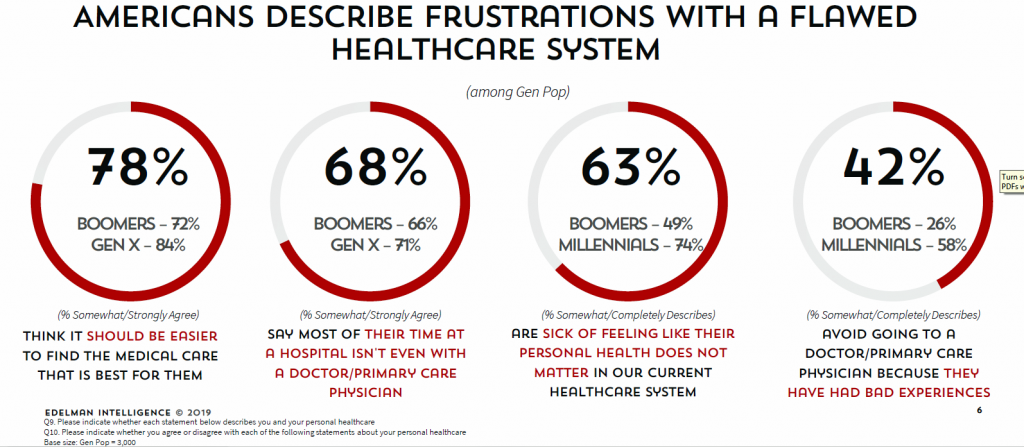
Americans face high costs and hassle factors in health care. But more people are taking care into their own hands, and welcome a growing role for technology to play in enabling self-care, supporting prevention, and improving treatment of diagnosed conditions, according to The Future of Connected Health, a consumer survey from ResMed.
For this research, ResMed interviewed 3,001 U.S. adults in June 2019, asking people to share perspectives on their health care experiences, the role of technology in healthcare, and devices they’d use to manage their care.
Most Americans feel it should be easier to find the medical care that is best for them, and are sick of feeling like their personal health doesn’t matter in the current health care system.
Four in ten consumers avoid going to a primary care visit because they’ve had bad experiences — that’s 1 in 4 Boomers and 6 in 10 Millennials.
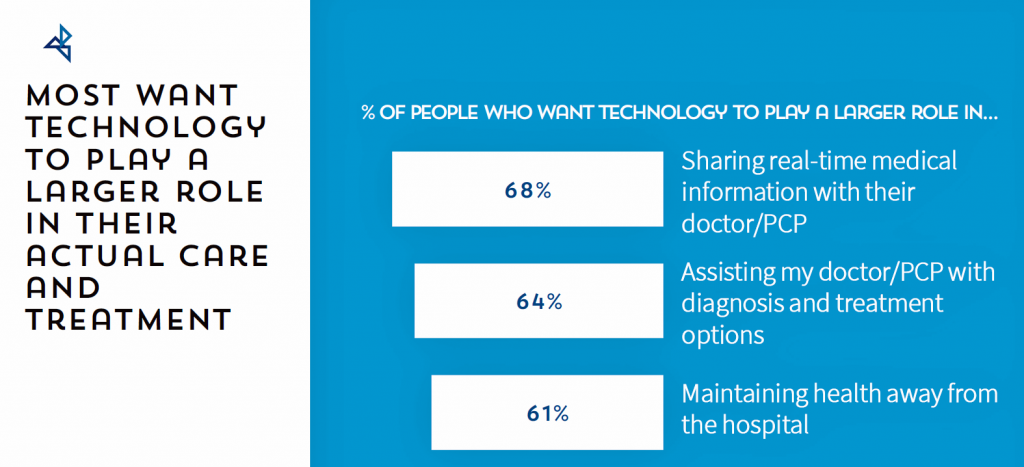
What’s the prescription to heal those frustrations? Technology. Six in ten consumers try to self-diagnose after browsing symptoms on the Internet including one-half of Boomers and three-quarters of Millennials. Again, six in ten people think they can identify the best treatments through their research without going to a hospital, true for one-half of Boomers and three-fourths of Millennials.
These datapoints demonstrate that self-diagnosing online (aka “paging Dr. Google”) is a new normal — and not just for younger people, but for one-half of Boomers, as well.
That underpins peoples’ perceptions where most agree that tech has made seeking medical treatments easier, and given people more peace of mind when dealing with their personal health issues, ResMed found.
Most consumers want technology to play a greater role in addressing hassles and negative experiences in U.S. health care. A majority of Americans want tech to help them share real-time medical information with their clinicians, assist those clinicians with supporting diagnosis and treatment options, and bolster personal health outside of the hospital inpatient setting.
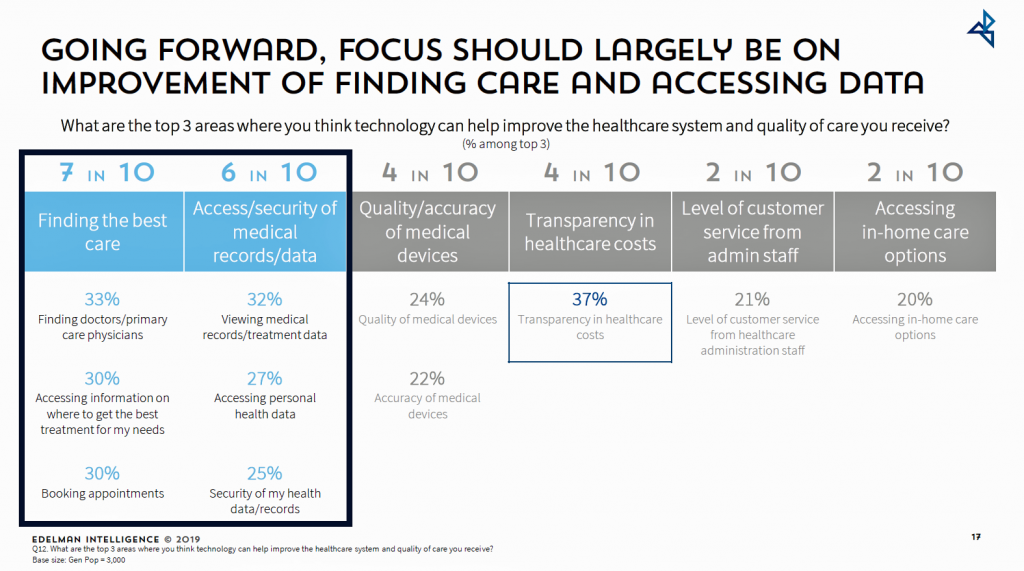 Looking at the future, U.S. consumers identified their top three areas where they think technology can help improve the healthcare system and quality of care received; these were:
Looking at the future, U.S. consumers identified their top three areas where they think technology can help improve the healthcare system and quality of care received; these were:
- Finding the best care, in terms of doctors, information on where the best treatments were delivered and booking appointments
- Accessing and securing personal health information, such as viewing medical records and treatment data, accessing personal health data, and securing personal health information, and
- Making health care costs transparent.
While most consumers in the ResMed study were bullish on the promise of technology to improve the quality and access of health care in America, people did identify drawbacks and barriers to achieving those outcomes. Over four in ten people thought digital technology makes getting medical care more difficult, not less, such as getting treatment for a medical condition and managing their personal health care.
To get the most out of digital health technology, consumers need to better understand how those tools can help them self-care and more effectively connect with their clinicians and other care providers. There’s optimism for this, because over one-half of the ResMed study respondents said that technology has already improved their relationship with their doctors. That’s a trusted relationship already in place.
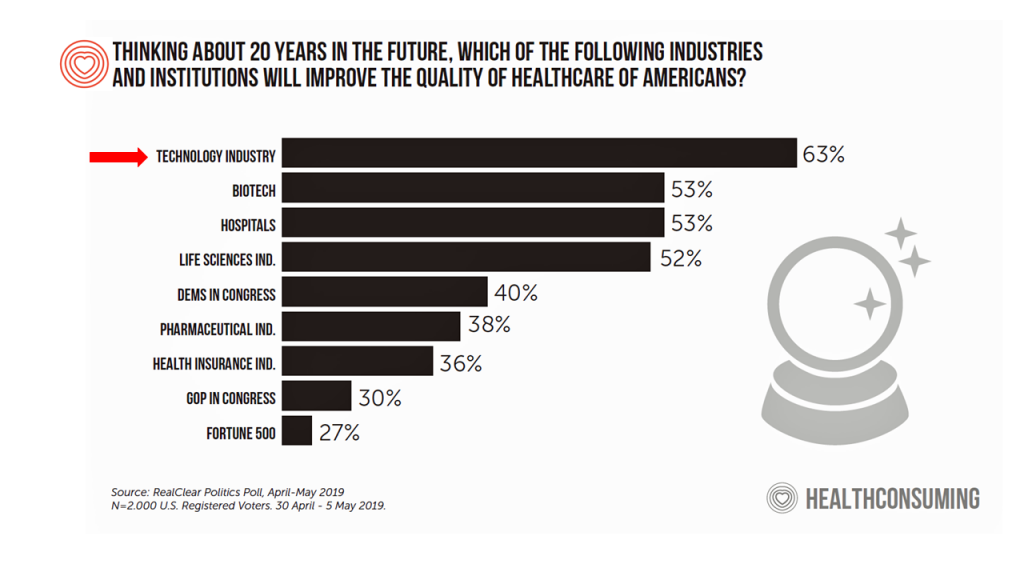 Health Populi’s Hot Points: This week at the Connected Health Conference in Boston, Dr. Joe Kvedar has convened innovators and users of technologies that “connect” patients and clinicians that support the continuum of health care, from prevention and wellness through to remote health monitoring for complex conditions that could once only be tracked and treated from a hospital bed.
Health Populi’s Hot Points: This week at the Connected Health Conference in Boston, Dr. Joe Kvedar has convened innovators and users of technologies that “connect” patients and clinicians that support the continuum of health care, from prevention and wellness through to remote health monitoring for complex conditions that could once only be tracked and treated from a hospital bed.
But patients don’t have as much patience to wait for the health care system, Big Pharma or politicians to make health care better. Patients – as consumers and voters – look to the technology industry to improve the quality of health care in America, the fourth chart illustrates from a RealClear Politics Poll conducted earlier this year.
As Dr. Kvedar has demonstrated through his many years as a pioneer leading the Center for Connected Health, it’s the entire health/care ecosystem that must collaborate to make health care better with the Quadruple Aim in mind — to support patients’ outcomes, enhance the care experience, bolster clinicians’ energies to prevent burnout, and lower per capita costs.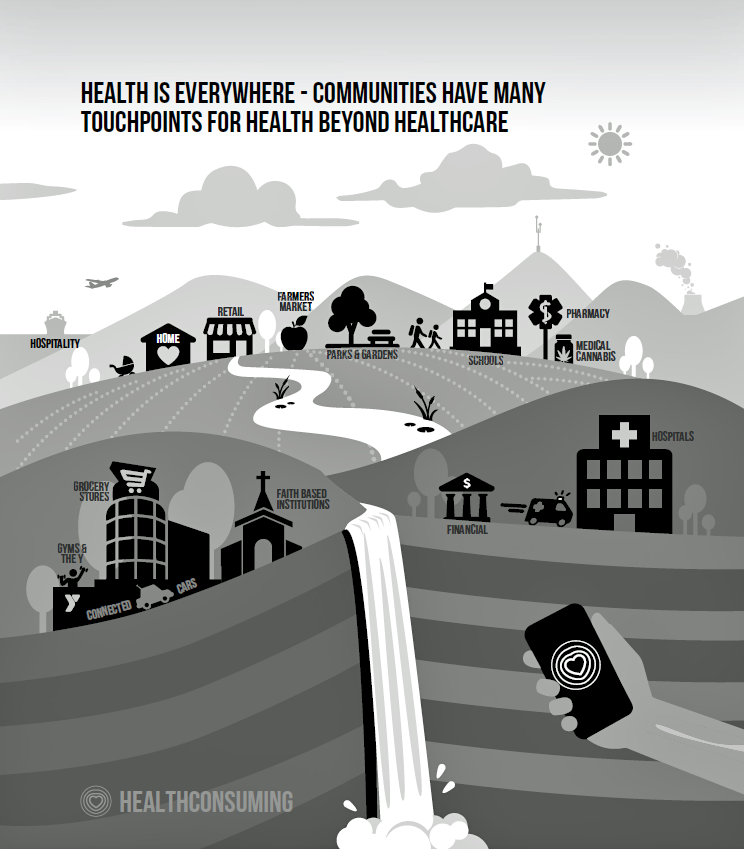 Yes, technology will absolutely underpin improvements, streamlining, enchantment, when those tools are well-designed with the users (patients, clinicians, administrative and financial managers) baked into their focus and workflows.
Yes, technology will absolutely underpin improvements, streamlining, enchantment, when those tools are well-designed with the users (patients, clinicians, administrative and financial managers) baked into their focus and workflows.
But as the centrality and primacy of the social determinants of health come into greater focus and importance in the mix of what makes health care, we can’t pin all our hopes on technology to Uber or Lyft us out of our fragmented and high-cost-by-design health care financing and delivery system. Public policies for agriculture and nutrition, transportation, labor, communications and education among them set the table for health. That’s where those “Dems in Congress” and “GOP in Congress” come into the mix, and a minority of Americans, soberly, see those folks as being part of improving the quality of health care in America.
And trust — that’s the key currency here, underpinning all health engagement across the continuum of well-to-unwell people. As Neil Jordan, General Manager of Retail Health at Microsoft said in an on-stage interview at the conference, “You only get to blow trust once, you only get to get it wrong once…the relationship between the caregiver, provider and patient in this case is one of the most trusted elements out there…smart retailers are understanding that and using [it] in a positive way — working with providers in the community, to become part of that trust circle, using the brand to do that rather than actively competing.”
That trust is in our barbershop, our church, our medical cannabis storefront, our retail pharmacy, our school, in our car, at a wellness retreat in the country, and especially in our home. Jordan’s taken a page out of my book, HealthConsuming, from “The New Retail Health” chapter, illustrated here. Health is everywhere, and our trusted touch-points for health are “ours” based on our own metric of value + values. Technology can help scale making health to where we live, work, play, pray, learn and shop.
The post Most People Want Technology to Play a Bigger Role in Their Health Care, ResMed Finds appeared first on HealthPopuli.com.
Most People Want Technology to Play a Bigger Role in Their Health Care, ResMed Finds posted first on http://drugsscreeningpage.blogspot.com/
No comments:
Post a Comment